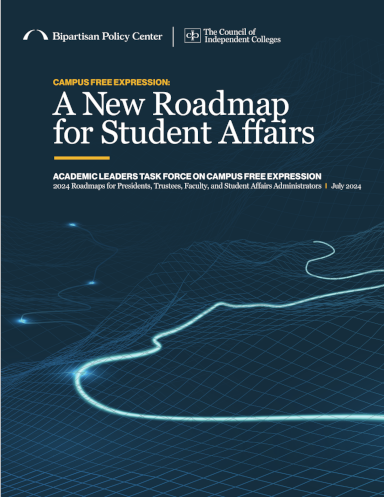Academic freedom and free expression are central to the work of higher education. Yet these two core principles are under great stress. Sometimes, the stress is direct. Well-intended attempts to foster diversity and inclusion and to prevent discriminatory harassment can move administrators to over-regulate speech and association. Or government actors exercise their oversight role in such a way as to suggest that universities that act on disfavored views of equality will be punished. Sometimes the stress is indirect, a matter of culture rather than regulation. Discussions are chilled by the fear of a censorious minority, on or off campus, left wing or right wing, that can make one’s life miserable and impose high costs on speakers. Increasing ideological uniformity on campus further constrains free inquiry and expression by faculty and students alike.
More broadly, faculty, student, and staff speech is constrained in a polarized environment in which different factions are powerful enough to punish it. Evidence is ample that the intellectual climate on many college campuses impairs discussion of matters about which people passionately disagree. Student affairs leaders and staff, who are negotiating this difficult environment amid falling trust in higher education, have an essential role to play in protecting academic freedom and free expression.
The chilling of campus speech is having an impact beyond campus borders. Rather than alleviating the political polarization in our nation today, the inhibition of campus speech is degrading the civic mission of higher education, carried out not only by faculty members but also by student affairs staff. That mission is to maintain our pluralistic democracy by preparing students for civic participation as independent thinkers who can tolerate contrary viewpoints and work constructively with those with whom they have principled disagreements.
In the modern university, student affairs administrators have become mediators between the institution, students, and other stakeholders. Student affairs staff regularly interact with students and are often the first to receive complaints when they are distressed by campus speech. Student affairs administrators are uniquely well positioned to explicate and foster reflection about the university’s approach to academic freedom and free expression. To do so, they must act not only as emergencies arise but consistently to support a healthy culture of academic freedom and free expression. The character and means of maintaining such a culture will vary according to the missions and histories of different campus communities. Nevertheless, student affairs leaders should not only affirm academic freedom and free expression but also actively support the rigorous exercise of these freedoms by fostering an environment that encourages robust yet respectful intellectual exchange so that students may draw their own conclusions.
Student affairs leaders and staff must take on four challenges:
- They must acknowledge the potential tension between upholding free expression and maintaining an inclusive and respectful learning environment for all. Every student affairs administrator who understands students’ stage of development and the anxiety-ridden society they live in knows that permissible speech can cause people to feel hurt or excluded from a community. While some expression may be hurtful, freedom of expression remains an essential condition of the genuine inclusiveness that characterizes communities of teachers and learners. It also remains essential to higher education’s academic and civic missions.
- Student affairs leaders and staff should champion a diversity of viewpoints on campus. Introducing students to a wide range of perspectives, while giving them the tools to listen carefully and to distinguish between stronger and weaker arguments, is at the heart of teaching. It is also essential preparation for the rigors of citizenship in a diverse society. The co-curricular programming over which student affairs leaders and staff preside should be designed to prepare students to confront complex questions that cause reasonable people to disagree.
- Student affairs leaders and staff should support strong policies for the protection of academic freedom and free expression and the consistent application of these policies to unorthodox and unconventional views, including those disfavored by most faculty and administrators. Student affairs programming should include an orientation for students and student affairs staff themselves on the college’s policies regarding academic freedom and free expression and the reasoning behind them.
- Student affairs leaders and staff should make the skills and dispositions necessary for academic and civic discourse a central aim of the collegiate experience. Absent such skills and dispositions, formal protections for free expression and academic freedom, though necessary, are insufficient to create a culture of open inquiry and respectful, productive debate on campus and in the nation. Matriculating students benefit from coaching and instruction in these skills and dispositions, for want of which our national discourse suffers. Our aim should be to graduate students who raise the bar for serious discourse. Student affairs leaders and staff should attend to how their co-curricular programs and events can support and reinforce that aim. At the same time, the culture of academic freedom and free expression is not just for students. Student affairs leaders and staff can do more to consider and adhere to the norms that characterize that culture.
Student affairs staff face considerable challenges in preserving free expression and academic freedom. Although no college’s staff is responsible for curing the ills of higher education nationally, this moment presents significant opportunities for staff to make a positive impact at their own institution.
In this guide, we first examine the role of student affairs administrators and explain the nature and importance of the twin values of free expression and academic freedom. Next, we survey some important changes in our social, political, and campus landscapes. Finally, we present a roadmap with recommendations for student affairs administrators seeking to invigorate a culture of robust yet respectful inquiry on their campuses.



